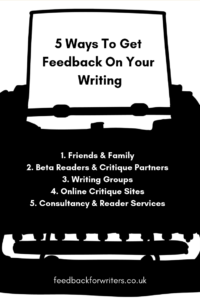
So you’ve written your thing? Hurrah! Now what? Get feedback, that’s what!
But how can you get it, and how do you decide which would be the best option for you? Let’s take a look at the main routes:
1. Friends & Family
It can be surprisingly difficult to get effective feedback from friends and family; not least because they love and care for you and don’t want to say anything mean…and because you love them back and want them to think well of you. Their good opinion matters. Nobody wants to fall out or have things taken personally – and writing , however much we like to pretend we’re all dead hard and so A-grade we can take anything, is just so personal.
This can make things tricky.
Feedback from your friends and family can often be frustratingly vague. Your mum’s “That was lovely, darling!” is NOT helpful feedback for your work. We’re not doing this for a pat on the head. That said, you don’t want the opposite. If you’re going to share work, you want to ensure you remain on speaking terms with your nearest and dearest.
When Can Friends & Family Help?
I’ve found there definitely are times that it is helpful to get feedback on finished work by someone you are close to. Just an ordinary reader, usually not a writer or armchair critic (definitely avoid those!), but someone interested enough to want the best for you and your work to succeed. After all, especially if it’s a novel you’re writing, it is ordinary readers who are ultimately going to be reading and hopefully buying your work. Your ultimate reader is probably only going to read your novel only the once. If you have someone in your vicinity who is part of your target market and who might be willing to give you a bit of a heads-up on likely reader first impressions, why not ask them very nicely to help?
- Is your mum perhaps a lover of crime thrillers and detective stories? (mine is!)
- Your best friend’s kid a devourer of Young Adult sci-fi fantasy?
- Your colleague a slipstream literary fiction afficionado?
Bear in mind, it’s risky. If you are going to go this route and there is someone willing, make sure you pick your person VERY carefully, and be precise about what you want them to look for. I’d avoid the “well, did you like it, or not?” question. DON’T choose anyone insensitive or who might have a cross to bear, or someone you’re trying to impress. You don’t need to prove your worth to anybody. Make sure it’s someone from whom you could take any honest but less-than-stellar feedback. Criticism, even mild, can often be harder to hear from someone you know than a dispassionate outsider, whom you can curse in the privacy of your own mind, with no danger of real-life comeback.
2. Beta Readers & Critique Partners
Technically, beta readers are supposed to be a live test audience for your work. In other words, target market readers who read your manuscript as if they are the eventual reader for your book, allowing you to test for likely responses so you can make adjustments and edits as necessary. The friends and family examples I gave above are really beta readers; it’s just the relationship side of things that can make getting useful feedback tricky and has to be carefully managed.
These days, however, you often see the term “beta reader” used interchangeably with what I’d more accurately call “critique partner.” In practice, these will often be particular writing friends with whom you’ve connected in the past and developed a mutual bond and degree of trust. They tend to know you and your writing style well and understand your writing process. They “get” you and what you are trying to do and are often used to your particular blind-spots and flaws. Often, they will be well-versed in writing craft and techniques, and are usually pretty good at feedback.
A good critique partner is a valuable asset – if you are lucky enough to have found one, look after them and nurture that relationship! Do make sure it’s mutual, and remember your critique partner does not exist merely to service your needs. We are all busy people with lives, and reading takes time. Make sure you regularly swap work and return the favour. Treat their work with the care, thought and attention you’d want for your own. Learn from one other. You’re looking for someone who is sensitive enough not to personalise any criticism but at the same time isn’t afraid to be honest and tell it like it is in a way that helps you improve your work.
Group Beta Readers
You could of course, also set up a group of proper beta readers to test your stuff out. Members of a book group, perhaps, or a mix of writers and non-writers. A good test reader should be specifically from your target market. Someone who’s not is likely to give you information that is irrelevant and, unless they are truly objective, their personal preferences often get in the way. You don’t want your high literature types sneering at your YA Fantasy; likewise, Fifty Shades fans aren’t going to be interested in your riff on Infinite Jest. Again, be specific about the feedback you want. Not “I want to know it’s marvellous and going to be a bestseller and how very clever I am.” (Even though that’s what we all want to hear, obvs). Prepare direct, specific questions about the characters, understanding of certain plot points, pacing, if it was predictable or confusing in places, for example.. What you want to get from your beta readers is a grounded understanding of whether or not your piece is working. Is it doing what you intend or not?
3. Writing Groups
Writing groups are for some people and not for others. And of course it depends on who you get in your group. I’m lucky enough to be a member of two writing groups – sometimes three – and they are great in different ways.
The most important thing when choosing a writing group is whether or not it is a good match for you and your work. Are group members generally at a similar stage in their writing lives? You ideally want a group where people are at a similar stage as you or just a little ahead of you in their writing careers. Is there a variety of genres people tend to write in or is everyone in the group into the same type of work? If the latter, is it your type? How is discussion conducted and how respectful is it of all members? Are there rules about how feedback is given, what sort of feedback is appropriate and what isn’t?
When Writing Groups Go Bad
Horror stories abound, of course. A woman I met at a workshop the other day told me she’d been rounded on by a clique in a new writing group and her worked ripped to shreds with not one word of positivity or constructive criticism. Essentially the leader of the group decided her work was worthless and it went round in a circle with each individual telling her exactly why this was so. Apparently one man put his hand up and said he’d rather liked it, but was shouted down and his views dismissed by the rest. Another friend, writing tentatively about the lesbian family relationships she’d grown up in, was told by the squirming members of her writing group that they didn’t want to hear about things “like that”, and that she was shoving “her politics” down their throats.
Again – you need to pick your people. Groups, especially where there are one or two very dominant personalities, can get very cliquey. (And of course many have the Guy-In-Your-MFA types lurking in their midst. Good for a laugh but can be quite frustrating.) Make sure yours is respectful of all members and their work. A variety of writing styles in evidence is helpful, as are signs that people give each other constructive feedback which gives the writers something to work on.
4. Free Online Critique Sites
What if you want the variety of views that a writing group can bring but don’t have anything local to your area? You could always join an online critiquing circle.
Be prepared to give and take. The best of these sites operate through “karma points” – you feed back on other people’s work, and earn enough karma points for your work to be read and commented on in return. Do note though that often you only get the basic service for free so it can take time to build up points – if you want all bells and whistles on the sites, you’ll sometimes find you have to pay for it.
The advantage of this approach is that it is fantastic practice and highly instructive to have to read a lot of others people’s work as well as writing your own. Seeing other people’s strengths and weaknesses can help make you far more aware of what your own particular talents and blind spots may be. And of course you’ll get a wide range of comments, just like in a writing workshop or group. Disadvantages are that obviously reading others’ work takes time. You’ll probably get a number of comments that don’t seem relevant and that you discard. And there are often limits with regard to how detailed you can be in your feedback, and also on the lengths of the pieces you can post. You need a thick skin, too; but that is something probably worth building up. Join one up for free (see links below) and check out the sort of stuff that gets posted to see if this might be the route for you.
https://www.critiquecircle.com
5. Paid Consultancy & Reader Services
Ah, last but not least. And not just a plug for yours truly – these services are not right for everyone, and as with every choice you make as a writer, it should be a case of picking what really works for you. I’d suggest trying the freebies first and then if you want something more, consider paid assessment options such as mine.
Look at what the different services offer, try to see sample reports if you can and think about what you need to take your writing forward. It may be the kudos of having a big-name author read your work (not me, sorry). It may be the window of possibility of having your novel recommended by the service to an agent (nope.) You may be after in-depth editorial and proofreading services (no); you may be at the stage where you are looking more for a detailed analysis of the big picture structures of the work (hello! *waves*). You may be looking to send a whole novel; you may be wanting in-depth notes on a couple of short stories. Think about where you’re at with your work, and what you’d like to know in terms of moving it forward. Be totally honest with yourself, and you will find you get more out of whatever service it is you choose. You need to know what you want so that you can ask for – and get – it. Exactly what you need.
So there we have it. Five ways of getting feedback on your work. Have I missed anything crucial? Let me know by leaving a comment below.

One Reply to “5 Ways To Get Feedback On Your Writing”
Comments are closed.